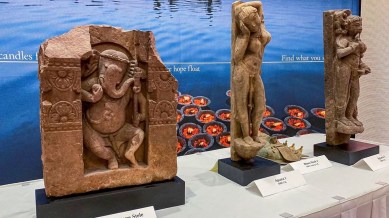India is close to signing an agreement with the United States under which the process for the return of stolen antiquities will be hugely simplified, The Indian Express has learnt.
Instead of India having to prove that the item in question belongs to it, the US will automatically offer it for return once the Cultural Property Agreement (CPA) comes through.
On being asked about the progress on the India-US agreement, a spokesperson for the US Embassy in New Delhi told The Indian Express, “We are eager to conclude a bilateral CPA, which would help to prevent illegal trafficking of cultural property from India to the US.”
The protection and return of cultural property is a priority for India and for the US, the spokesperson said, adding that they have been working closely with the Ministry of Culture and the Indian Embassy in Washington on this issue for close to two years.
There are several steps the US takes, consistent with their domestic law, before an agreement can be concluded. Once a country makes a request for an agreement, the request is considered by the White House-appointed Cultural Property Advisory Committee, which makes a recommendation to the Department of State. “The next step for India is to have its request considered before this Committee,” the spokesperson said.
It was during Prime Minister Narendra Modi’s state visit to the US in June this year that the two countries reached an understanding to work on the agreement. India has put a renewed focus on repatriation of its heritage over the last few years, with the PM having broached the matter with several global leaders and multilateral institutions during his foreign visits. According to government data, over 400 antiquities have been brought back to India since 2014.
Culture Secretary Govind Mohan told The Indian Express: “As per the agreement presently underway, the US will intercept smuggled goods at the border and return them expeditiously. Once it is implemented, the current process of repatriation will be simplified, and early return of antiquities will become possible. It is expected to come into effect in a few months.”
Story continues below this ad
ExplainedThe template agreement
Buoyed by the progress made with the US — from where the largest number of antiquities have come back in last few years — India is looking to sign such agreements with several countries where a lot of Indian art objects are believed to have been smuggled.
The agreement imposes import restrictions that stop looted and stolen cultural property from entering the US while encouraging the legal sharing of such objects for scientific, cultural, and educational purposes. The US also prioritises stopping trafficking of art objects to “eliminate key sources of funding for terrorists and transnational organised crime”.
“When objects are seized and forfeited under import restrictions created by the CPAs, there is a simplified process for returning objects to the partner country. The partner country does not have to prove the item is theirs. Rather, the United States automatically offers it to them for return,” the US Embassy spokesperson said.
Presently, once an artefact of Indian origin is located in a foreign country, its provenance has to be established through documents such as FIRs and pictorial evidence. The objects are then verified by the Archaeological Survey of India (ASI) —the custodian of all antiquities — in the host country before they can be brought back home.
A team of experts from the ASI visits the country and verifies the objects “on the basis of their knowledge, iconography and wear-and-tear marks”, an ASI official said. However, there is no time limit for this process.
Story continues below this ad
Recently, an ASI team was in Singapore to verify several Chola bronzes that were stolen from India, and a team is also expected to go to the US to verify a cache of 1414 objects that the US offered to India after it found them to be of Indian provenance.
Once the agreement comes into effect, this verification stage — which is generally most time-consuming — can also be done away with in many cases. According to the US official, they connect their law enforcement personnel with subject matter experts — archaeologists, curators, and conservators — who help identify cultural property pursuant to official investigations.
Over the last two decades, the US has repatriated over 20,000 objects to more than 40 countries and institutions. The repatriated objects have included paintings, sarcophagi, statues, coins and illuminated manuscripts. In the last four years, India has brought back about 400 smuggled/ stolen antiquities from the US.
In fact, the US has 25 active bilateral cultural property agreements including with Afghanistan, China, Cambodia, Egypt, Greece, Italy, Jordan and Turkey. Even as these agreements do not provide a timeline for returns, the process is generally smooth and faster than what it would have otherwise.
Story continues below this ad
Each agreement enacts import restrictions tailored to the partner country’s needs and guided by definitions of archaeological and ethnological materials in the Convention on Cultural Property Implementation Act. The number of countries with agreements or requesting agreements has doubled since 2017, the US Embassy spokesperson said.
Secretary Mohan said India is pursuing agreements pertaining to the return of antiquities with various countries through bilateral and multilateral routes. “With the US having accepted this kind of a framework, India is hopeful that the other countries will also look at something similar, if not identical,” he said.
